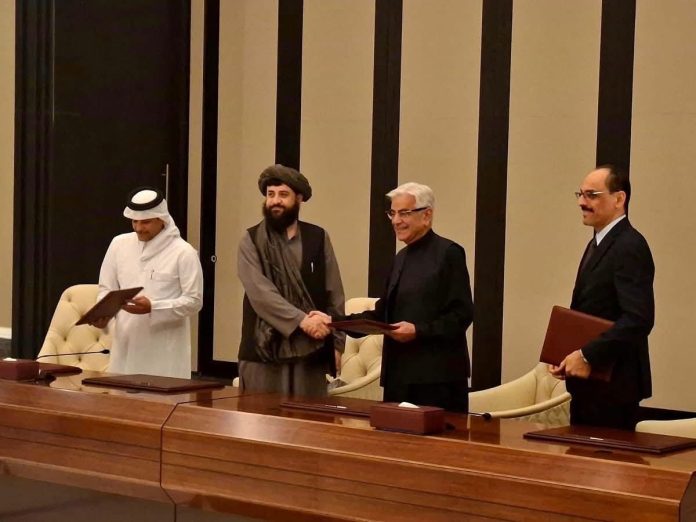ceasefire deal
reached in Doha
Both sides commit to respecting each other’s sovereignty and will meet again in Istanbul on Oct 25, says Khawaja Asif
Centreline Report
DOHA: Pakistan and Afghanistan have reached a landmark ceasefire agreement, marking a potential breakthrough in efforts to restore peace and stability along their troubled border, Qatar’s Foreign Ministry announced in a statement issued late night on Sunday.
The ceasefire agreement, mediated by Qatar and Turkiye, is expected to lay a strong foundation for lasting peace in the region, according to the Qatari officials.
Both countries have also agreed to hold further meetings in the coming days and to establish a permanent mechanism to ensure peace and stability between them.
“During the negotiations the two sides [have] agreed to an immediate ceasefire and the establishment of mechanisms to consolidate lasting peace and stability between the two countries,” read the statement issued by Qatar’s Foreign Ministry.
“The two parties [have] also agreed to hold follow-up meetings in the coming days to ensure the sustainability of the ceasefire and verify its implementation in a reliable and sustainable manner, thus contributing to achieving security and stability in both countries,” it added.
Confirming the agreement, Defence Minister Khawaja Asif, who led Pakistan’s delegation in Doha, expressed hope that the ceasefire would end border tensions between the two countries.
Asif said the delegations from the two sides would meet again in Istanbul on October 25 as he emphasised that both countries have agreed to respect each other’s territorial sovereignty.
The defence czar added that under the agreement, terrorism from Afghanistan on Pakistani soil will stop immediately.
He also thanked Qatar and Turkiye for mediating talks with Afghanistan.
Pakistan and Afghanistan held the first round of talks mediated by Qatar in Doha on Saturday. Defence Minister Khawaja Asif led the Pakistani delegation, while his Afghan counterpart Mullah Yaqoob headed his country’s negotiators.
Furthermore, sources said senior security officials accompanied the defence minister to support the negotiations. The Afghan intelligence chief was also part of the Kabul delegation.
Pakistan told the Afghan delegation that the presence of militant groups in Afghanistan was “unacceptable”, sources added.
Meanwhile, Deputy Prime Minister and Foreign Minister Ishaq Dar termed the ceasefire agreement “first step in the right direction”.
“We look forward to the establishment of a concrete and verifiable monitoring mechanism, in the next meeting to be hosted by Turkiye, to address the menace of terrorism emanating from Afghan soil towards Pakistan. It is important to put all efforts in place to prevent any further loss of lives,” DPM Dar said in a post on X.
The two neighbouring nations are witnessing heightened tensions amid the Afghan Taliban regime’s reluctance to act against terrorist groups, operating from Afghan soil, in the backdrop of rising terror attacks in Pakistan.
The Taliban forces and India-backed Tehreek-e-Taliban Pakistan (TTP), alias Fitna al-Khawarij, resorted to an unprovoked attack on Pakistan on October 12.
The Pakistan Armed Forces gave a befitting response to the aggression, killing over 200 Afghan Taliban and affiliated militants in a self-defence action. The military’s media wing, Inter-Services Public Relations (ISPR), said that 23 soldiers embraced martyrdom in the clashes with the Taliban forces and the terrorists.
Furthermore, the security forces also conducted “precision strikes” in Afghanistan’s Kandahar province and the capital Kabul, successfully destroying multiple strongholds in response to recent aggression.
After the ceasefire, Prime Minister Shehbaz Sharif said that Pakistan is ready to hold talks with the Taliban regime in Afghanistan on reasonable terms.
The country has witnessed a surge in cross-border terror incidents since Taliban rulers returned to Afghanistan in 2021, particularly in the bordering provinces of KP and Balochistan.
The two countries share a porous border spanning around 2,500 kilometres with several crossing points, which hold significance as a key element of regional trade and relations between the people on both sides of the divide.
However, the issue of terrorism remains a key issue for Pakistan, which has urged Afghanistan to prevent its soil from being used by groups such as the banned TTP to carry out attacks inside the former’s territory.
Pakistan also conducted “precision strikes” on verified camps of the proscribed Gul Bahadur group in the border areas of North and South Waziristan districts, said Information Minister Attaullah Tarar in a post on X.
“In these precision strikes, [a] minimum [of] 60-70 Kharjis [terrorists] and their leadership have been sent to hell based on confirmed intelligence reports,” the minister said.
Tarar also noted that militants affiliated with the Khawarij group and operating from Afghanistan attempted multiple terrorist attacks inside Pakistan, saying that all such attempts were effectively thwarted by the country’s security forces who responded effectively, eliminating over 100 militants affiliated with the Khawarij group.

















